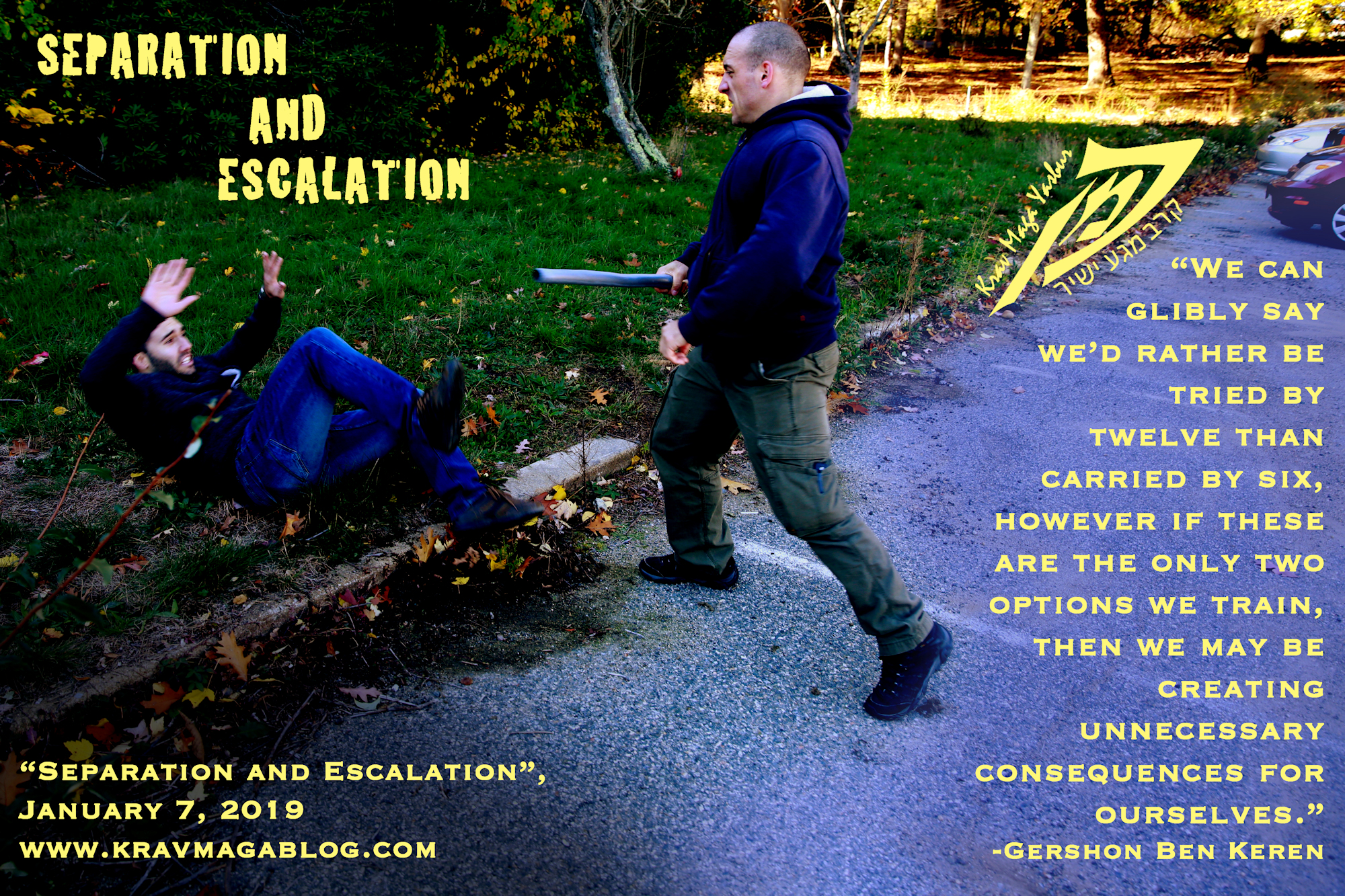What may seem to us as a single incident, may not be from a legal perspective. If you disarm somebody of their weapon, such as a gun, and step back 5 or 6 yards, a separation has occurred; what happens next will be looked on as something separate, to what preceded it, and how you now decide to act will be judged on its own merits i.e. you are now the one in possession of a lethal weapon, and the power differential has shifted, etc. The burden of proof will now be on you to justify your further actions e.g. if you deem that the person is a threat because they move towards you, and you decide to shoot, you will have to justify the use of lethal force in that moment – what went on before will give a “background” to your decision to shoot, but it won’t justify it i.e. in that moment, where there was distance between you, and you were in possession of a firearm, why did you determine that lethal force was necessary? Obviously, different US states have different viewpoints concerning “stand your ground”, etc., however understanding the concept of how a violent encounter may be broken down into separate incidents, which may be viewed/looked at differently is important when considering our self-defense solutions – and it can be quite far-reaching. This doesn’t mean we should over-think things to the point where we are paralyzed and end up doing nothing, but we might want to consider using the gun as a cold weapon, to deliver concussive strikes, and render an assailant unconscious whilst we are still “engaged” with them, rather than stepping back, as we tap and rack the weapon, hoping and assuming that the threat of lethal force will be enough to subdue them, etc. Our decision-trees should be determined ahead of an event, rather than in the midst of it.
I teach and believe in the use of improvised weapons, however there is a huge difference between striking somebody when you have something in your hand, and getting something, or altering something in order to have a “weapon” in your hand e.g. if you are drinking at a bar with a bottle in your hand, and somebody attacks you, and in response you hit them back, and the bottle makes contact, this is one thing; to deliberately smash the bottle on the bar, and then use it to stab and slash your aggressor’s face is another; your intent and escalation are evident. It is also worth noting that should you have to go to court, you are not necessarily going to be arguing your case to a sympathetic audience. Most people have a limited experience of violence, and will not be able to associate with smashing a bottle in order to make a weapon, picking up a brick to arm yourself, or returning to your car to retrieve a tire-iron, etc. especially if an opportunity to disengage was available to you – even if you are in the legal “right”, if t doesn’t look/seem/feel that way to a jury, they will judge against you (and if the other party is standing there with a permanently scarred face, because of what you did, there’s a good chance that he’ll be seen as the individual deserving sympathy, despite the legal rights and wrongs of the situation). Some instructors demonstrate how to “construct” weapons out of everyday items. A common “improvised” tool that football hooligans used to make/use was a newspaper, folded up to make a “brick”. As good and effective as such an impact weapon is, taking the time to construct it demonstrates intent, and a certain thought process; and this will have to be justified if things go legal. As I say, I’m a supporter and believer in the use of improvised weapons, but the “story” behind their selection and use, must make sense, from a legal perspective. Having your phone in your hand, and using it to make hammer-strikes, is a good use of an improvised weapon - and is it beyond reasonable doubt, that you didn’t have it in your hand already when you were attacked?
Sometimes we physically separate but don’t do so emotionally, and so feel that we are still involved in an initial altercation. I have seen this happen on numerous occasions when working door security e.g. an altercation that took place outside of the club (which at the time I/we were unaware of), gets brought inside and plays out some time later e.g. somebody, or a group, got into an argument in another bar/club, which didn’t result in anything, and then find themselves together again later, etc. It may be that one person/party thought everything had been sorted or was forgotten, without realizing that the other(s) was still stewing on the perceived injustice and disrespect they’d been shown earlier i.e. they hadn’t emotionally separated from the previous incident; for them the incident hadn’t ended. I have separated many fights, where one person was arguing that the other had started it, because of something that happened several hours earlier. I mention this to illustrate that morality and legality are not the same, despite how strongly we might feel about something. Morally, an individual may feel justified to teach another person a lesson for a past injustice or slight, and believe that it is only fair for them to do so – and that this would in some way benefit society e.g. this person will learn that they can’t act and behave in this way towards others, etc. Such mini moral crusades, however strongly they are felt, can rarely be used as a legal justification for future acts of aggression and violence. If that person then brings a civil suit against you – assuming you escaped criminal charges – and you end up paying them $30 000 in damages (a conservative estimate), who has “won” in that situation?
We don’t want to overthink our self-defense solutions, but we should recognize that self-defense is a legal concept, not a moral or absolute one. Some separations may be obvious — such as when there may be a long period of time between incidents — some may be less so e.g. if I take somebody to the ground, whilst I remain standing, and then stamp on their head – the person’s position has changed, and in this moment, they are no longer a threat to me, etc. Could they pull a weapon? Yes, but do I have a good reason to believe they were about to do so, and will 12 individuals who have never experienced violence before, believe such a story? If in that moment I had an opportunity to disengage and get to safety, that’s a safer option, than stamping them and/or continuing the fight on the ground – creating a separate incident. We can glibly say we’d rather be tried by twelve than carried by six, however if these are the only two options we train, then we may be creating unnecessary consequences for ourselves.
Share:

Gershon Ben Keren
2.8K FollowersGershon Ben Keren, is a criminologist, security consultant and Krav Maga Instructor (5th Degree Black Belt) who completed his instructor training in Israel. He has written three books on Krav Maga and was a 2010 inductee into the Museum of Israeli Martial Arts.
Click here to learn more.

